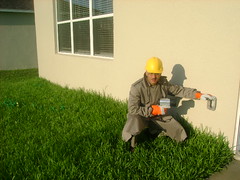A DIY Landlord’s Guide to Landlord Licensing, Part II
Yes, that’s a 500 grand fine!! How do you like that?
 Last week, we laid out the basics of the Landlord Licensing (a.k.a. Rental Certification) process. This week, we’re going to talk about a few of the ways that the process can get challenging — specifically, the ones that will cost you a significant amount of money. As we mentioned last week, most of what we’re sharing here applies everywhere, but be sure to check with the municipality where your rental property is located to confirm.
Last week, we laid out the basics of the Landlord Licensing (a.k.a. Rental Certification) process. This week, we’re going to talk about a few of the ways that the process can get challenging — specifically, the ones that will cost you a significant amount of money. As we mentioned last week, most of what we’re sharing here applies everywhere, but be sure to check with the municipality where your rental property is located to confirm.
If a Permit is Required for Work Previously Done
Some of you may have no idea what we’re referring to here, so let’s explain. Basically, when a specific repair requires a significant amount of expertise to do safely, the city will require that a licensed contractor pull a corresponding permit for that specific repair. The main types of permits are electrical, HVAC, plumbing and general building.
When a rental inspection is performed, the inspector notes any recent repairs that would have required a permit. When they get back to their office they check the city’s records to see if that permit was pulled and a corresponding inspection passed. If no permit was pulled, they will require one to be pulled and the work inspected.
We run into this situation in two ways:
1. An owner purchased a property without getting the proper purchase inspection that verified all recent work had the proper permits pulled or no one checked with the city for open permits.
2. The owner did some electrical, plumbing, etc. work themselves and avoided pulling the required permits to save a few bucks.
Why is this a big deal? Because many contractors will not pull a permit and assume the liability for work they did not perform.
Sometimes, you’ll find a reasonable contractor willing to inspect the work, verify that it’s done right, pull a permit for it and it easily passes city inspection. In a worst-case scenario you’ll be at the mercy of a contractor and city inspector, and be required to rip out drywall and such to expose the work so it can be inspected for compliance. There’s also the extra challenge in this scenario of finding a contractor willing to pull the permit for someone else’s work within the city imposed deadline.
Expensive Inspection Required Repairs
One of the worst requirements you can get on a rental inspection report is “foundation must be repaired.” Not far behind are violations that require the electrical, plumbing, etc. be brought up to current codes. Some of these required repairs can be so expensive, that we’ve had owners decide to sell a property rather than do the repairs to comply.
Here’s where you want to understand the “grandfather clause” compliance concept. A property is only required to meet the building codes at the time the home was built or the current codes that are not economically unreasonable. One of the most common examples is hard-wired smoke detectors – while they are required on all new construction, they usually are not required to be installed on older homes because the cost of cutting multiple holes in walls & ceilings to run the electrical wires would cost way too much to repair. So, battery operated smoke detectors are allowed instead. Understanding when a grandfather clause is appropriate and pointing it out (politely) to a city inspector can save you a lot of money.
If a Tenant Must be Relocated
Some repairs are so extensive that they will make the home uninhabitable until completion. Depending on state law and the terms of your lease, you may be legally obligated to provide your tenants with another place to live until they can move back into the property. This can get expensive fast if you end up being forced to rent a multi-bed hotel room for a family for a week while your basement undergoes extensive mold remediation (for example).
Foreclosed, Condemned & Vacant Properties
If a property was recently foreclosed on, was condemned or sat vacant for an extended period of time and now you want to get a landlord license on it, be forewarned that the city may legally chuck any grandfather clauses and require the property to meet all current building codes.
We’ve also seen this come into play if extensive renovation work is being done on a property. Moving walls or replacing drywall may expose enough of the “bones” of a property allowing the city to require you to update electrical, plumbing, etc.
These aren’t the only complications that can arise during the landlord licensing process, but they are the ones that can take the cost from pricey to unreasonable. Hopefully, knowing what the process looks like and what the biggest pitfalls are, you’ll be prepared to navigate the process. Good luck!